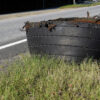Troy University Chemistry and Physics professor Shaoyang Liu has been awarded a $534,194 grant from the National Science Foundation, NSF, to support his research into developing reliable methods to test recycled plastics for toxic residues and hazardous chemicals.
His research, titled “RUI: Sensitive and Rapid Detection of Hazardous Volatile Organic Compounds (VOCs) in Recycled Plastics Using Solid-Phase Microextraction,” aims to give consumers peace of mind for the use of recycled plastics.
“Recycled plastics play a crucial role in building a sustainable future, but they often contain impurities, including toxic residues and hazardous chemicals,” Liu said. “This research will develop a sensitive, convenient and reliable method to detect hazardous VOCs and ensure recycled products are safe for everyday use.”
VOCs from recycled plastics pose unique challenges due to their complexity and potential health risks. Liu’s work will focus on using headspace solid-phase microextraction coupled with gas chromatography-mass spectrometry (HS-SPME-GC-MS) to create a robust testing method. His research will optimize parameters such as fiber type, temperature, exposure time and column selection to maximize detection sensitivity. Once finalized, the method will be applied to commercial recycled plastic samples for validation.
“Monitoring and reducing hazardous VOCs protects consumers and workers from health risks, contributing to healthier communities,” Liu said. “Economically, improving the quality of recycled plastics boosts marketability, enhances industry viability, creates jobs and fosters innovation. The findings could also inform policymakers and regulatory agencies, helping shape future safety standards for plastic recycling.”
The project also carries broad implications for environmental sustainability and the recycling industry. By developing a reliable tool to monitor VOC contamination, this research could improve the safety and quality of recycled plastics, boost consumer confidence and encourage higher recycling rates—ultimately reducing plastic waste in landfills and protecting ecosystems.
“This grant not only supports groundbreaking research, but also provides valuable opportunities for Troy University undergraduate students to engage in hands-on research,” Liu said. “Our students will gain experience in state-of-the-art analytical chemistry techniques that can benefit local industries and strengthen the STEM workforce.”
This project is funded under NSF’s Research in Undergraduate Institutions, RUI program, and the research is being conducted at TROY’s Center for Materials and Manufacturing Sciences.
















































